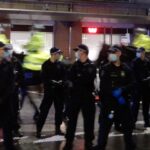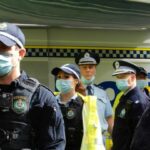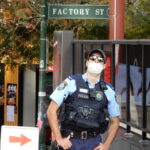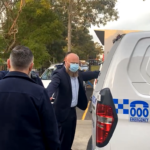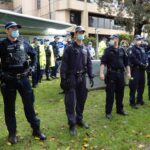Police Profiling Intensifies Under COVID: An Interview With NUAA’s Dr Mary Ellen Harrod
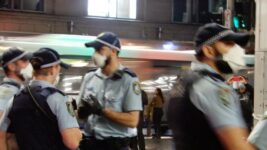
The academic paper Policing Biosecurity sets out that of the people NSW police officers pulled up over a suspected COVID breach during the three months to 15 June last year, 45 percent were subsequently searched.
However, in stark contrast, just over 15 percent of those same individuals were actually issued with a COVID breach fine.
Under the terms of the relevant legislation, NSW police officers must have a reasonable suspicion to search an individual and suspecting that they’ve stepped outside of their home without a reasonable excuse, doesn’t cut it.
According NUAA, the police statistics relating to searching and fining those pulled up under the second Greater Sydney lockdown is likely to be higher, as it’s been hearing about these incidents from a number of its members, when comparatively little was heard during the first.
The NSW Users and AIDS Association advocates for the rights of people who use drugs, as, due to the illegality of certain substances, these individuals tend to suffer significant discrimination and stigma.
And the charge that NUAA is laying against NSW police is that during the recent extended lockdown period, officers have been profiling people on the street as if they might use drugs, and then stopping and scrutinising them, with COVID breaches being the excuse to do so.
Criminalising a virus
The heavy-handed and overbearing policing of the pandemic has many similarities to the war on drugs.
In both cases, law enforcement has been used as the frontline in dealing with a public health crisis. And just as you can’t arrest your way out of a drug crisis, neither can you fine your way out of a pandemic.
The majority of people in Australia who drink alcohol don’t develop a problem, and neither do most individuals who use drugs. But for those who do develop problematic use, it’s much easier to seek help for an issue with alcohol, than it is for those who have an issue with an illegal substance.
And as law enforcement has been the main response to COVID restrictions – rather than adequate support –we’ve seen officers taking to the streets to hand out massive fines to people, who mostly can’t afford to pay them, in some sort of effort to guarantee their health.
Decriminalising drugs
The campaign to decriminalise illicit drug use was at fever pitch in NSW right before the initial onset of COVID-19.
Civil society groups, organisations that represent lawyers and churches were all stepping up to call for the offences around personal drug possession and use to be repealed.
But this human rights issue has been swept to the side during the virus and it remains unresolved.
Delivered right before COVID arrived on Australian shores, the comprehensive recommendations of the NSW Special Commission of Inquiry into the Drug “Ice” provide a blueprint as to how the public health drug crisis might be dealt with in a manner other than the regressive policing approach.
Sydney Criminal Lawyers spoke to NUAA chief executive Dr Mary Ellen Harrod about instances of police officers overstepping the mark with COVID powers, the impact the pandemic has had on people who use drugs, and why its high time the ice inquiry recommendations were acted upon.
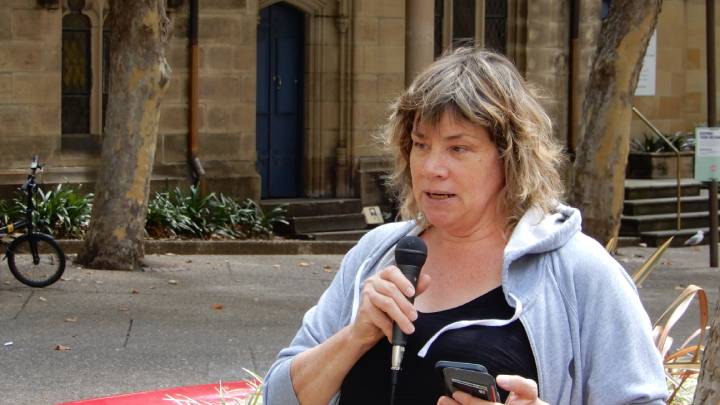
Over the last 18 months, NSW police officers have had the ability to stop people on the streets over potential COVID breaches.
NUAA has heard from a range of members and associates who claim officers have been applying these powers in a manner contrary to their official purpose.
So, Mary, broadly speaking, what’s been happening in this regard?
There has been a real difference between the first lockdown period and the second. The first lockdown period had a much more mild-mannered approach. It seemed like more of a health approach to helping people isolate.
We actually had some good feedback about policing in that period, where police were going easier on people. Obviously, that was not everybody’s experience.
But with the second lockdown, we have had continual feedback about people being ostensibly stopped for COVID reasons, but then, a number of negative consequences have followed.
We had a member fined around $1,000 for going to pick up prescribed medication at a chemist that was within the local government area that they lived in. And regardless of the fact that it was prescribed medication that was held at the chemist for him, he received the fine.
That is just one example. A lot of people have been going to get prescribed medication and have been threatened with fines to the point where we have had to ask the Ministry of Health to liaise with police to ask them not to do this.
People have had to be issued with letters to go and attempt medical appointments, which has helped. But the threat of fines when people have reasonable excuses to be outdoors, is pretty traumatic.
The other thing we’ve seen is people being stopped for health reasons and then searched. It’s unclear to me what these two things have to do with each other.
What is the need to search somebody if the concern is that they might have COVID? It doesn’t make sense.
That has been happening to particular people repeatedly, and it’s been under the pretext of COVID.
This is not something that wasn’t happening before COVID, it was. But it has intensified during COVID.
On top of that, people are getting hit with heavy fines of thousands of dollars. And as we all know, it is the people who can’t afford it the least that are getting these penalties.
So, would you say the same people who were being stopped and searched for questionable reasons before the pandemic, are now being stopped, searched, and issued with a steep COVID fine as well?
Yes.
Okay. And why is this happening?
It’s profiling. If someone looks, in the police officer’s mind, to be a drug user, then the police are stopping them.
Yes, that happened before COVID, but it’s happening a lot more under COVID. And this is actually preventing people from accessing health services.
The Greater Sydney lockdown was lifted on Monday, but many restrictions remain. Police may now have a reason to check people’s details to ascertain whether they’ve been fully vaccinated in order to legally partake in certain activities.
Are you concerned that some of the overreach that has been occurring under the policing of the lockdowns will continue to occur under this new situation?
I’m not sure what the justification would be to check for full vaccination if someone is just walking along the street. My understanding is that it’s going to be if you are going to a shop or a pub.
A lot of people aren’t going to have access to the technology to prove they’re vaccinated.
I had to download the certificate onto a smartphone and there were a whole range of steps before I could get the proof of vaccination.
It wasn’t that straightforward. And I know of people who have had difficulty in getting proof of vaccination.
For people that we represent, it’s going to be more challenging to get proof of vaccination, so they may be excluded from different venues.
I’m not sure how it will shake out with the policing. But, yes, we have ongoing concerns because we had them without COVID. And COVID has certainly intensified it.
In general, we’ve heard instances of police stopping and publicly strip searching people or stopping them based on profiling.
Our argument is that this genuinely impacts people’s ability to access health services. It has a very negative impact upon them.
I have a wait and see approach to what will happen in the future, but there are concerns.
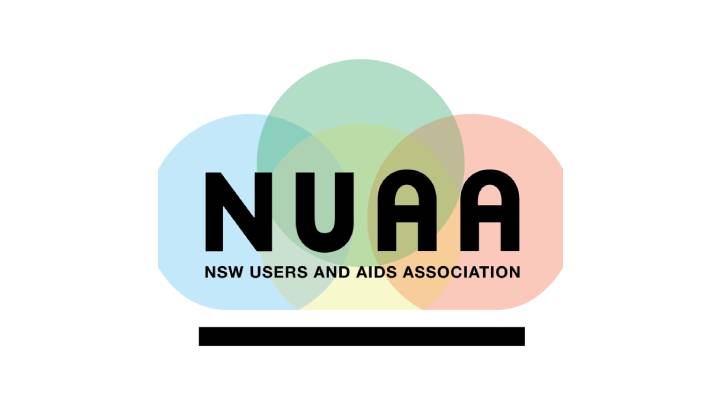
NUAA is an organisation that advocates for the rights of people who use drugs and are impacted due to the discrimination and harms caused by criminalisation.
How have these communities fared under the recent prolonged Greater Sydney lockdown?
Aside from the policing issues, there have been a lot of impacts. So, again, this lockdown has been markedly different from the last.
At the start of this one, people had difficulties in accessing services. The safety net hasn’t been there and that’s had a negative impact on people.
The other thing that’s been happening – that’s intensified in this lockdown – is the drug supply has become adulterated.
There have been a lot of warnings over the past months about fentanyl being mixed in with various drugs. And there have been a number of deaths because of fentanyl.
So, there’s a lot of concern about the overdose rate and people being able to access support with overdose.
There have been a range of other negative impacts. A lot of people have been put into strict isolation, such as what happened at Common Ground. And once they’re in there, managing their health issues has been quite challenging.
There have been issues with communications with people who have been put into these hard lockdowns. And the rules haven’t always been clear.
People have also been quite anxious, as rules have been changing swiftly. This has been in particular for people attending treatment clinics. And those changes, even if they’re communicated well, provoke great amounts of anxiety.
There have also been all the cases of COVID within the community as well.
On the flipside of all of that, there has been a really concerted response by Health to address these issues to make sure people’s treatment continues, and also working with the police, so that people aren’t fined for going out to access treatment.
Health has rolled out vaccinations into as many settings as possible. We have assisted with vaccination clinics with Hunter New England Health in Cessnock.
They have had outbreaks in Hunter New England, and we have supported them to reach out to our community up there.
We have done a lot of work with resources as well, with the Ministry of Health.
So, there’s been a lot of people working to ensure those in the community who do have to isolate have their services continue, as well as helping with rolling out the vaccination in key areas.
So, it hasn’t been all bad. There has been quite a lot of work done. Even Dr Chant highlighted that people who use alcohol and other drug services are a key population group to get access to vaccinations.
There have been pluses.
And lastly, Mary, as you said, we will have to see how the policing of the next stage of the pandemic goes, but you’ve mentioned that discriminatory policing was a problem prior to COVID.
So, what would NUAA like to see in terms of reforms?
First and foremost, we would like to see the Ice Inquiry recommendations implemented.
On that big wish list, I would like to see a state AOD strategy, which we still don’t have, even a year after the findings of the inquiry.
We need a whole-of-government approach to these issues, so it’s not Health in opposition to police, like it so often is.
Then, of course, if illicit drug use was decriminalised, and we took a more rational approach to it, as was recommended by the Ice Inquiry, that would be the single biggest change that we would like to see happen.


